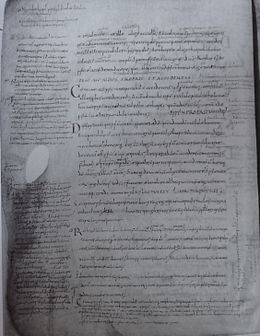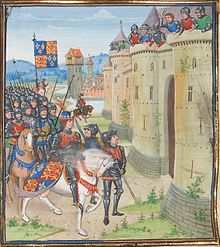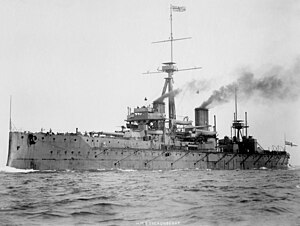Portal:History
The History Portal

Historia by Nikolaos Gyzis
History (derived from Ancient Greek ἱστορία (historía) 'inquiry; knowledge acquired by investigation') is the systematic study and documentation of the human past. History is an academic discipline which uses a narrative to describe, examine, question, and analyse past events, and investigate their patterns of cause and effect. Historians debate which narrative best explains an event, as well as the significance of different causes and effects. Historians debate the nature of history as an end in itself, and its usefulness in giving perspective on the problems of the present.
The period of events before the invention of writing systems is considered prehistory. "History" is an umbrella term comprising past events as well as the memory, discovery, collection, organization, presentation, and interpretation of these events. Historians seek knowledge of the past using historical sources such as written documents, oral accounts or traditional oral histories, art and material artefacts, and ecological markers.
Stories common to a particular culture, but not supported by external sources (such as the tales surrounding King Arthur), are usually classified as cultural heritage or legends. History differs from myth in that it is supported by verifiable evidence. However, ancient cultural influences have helped create variant interpretations of the nature of history, which have evolved over the centuries and continue to change today. The modern study of history is wide-ranging, and includes the study of specific regions and certain topical or thematic elements of historical investigation. History is taught as a part of primary and secondary education, and the academic study of history is a major discipline in universities.
Herodotus, a 5th-century BCE Greek historian, is often considered the "father of history", as one of the first historians in the Western tradition, though he has been criticized as the "father of lies". Along with his contemporary Thucydides, he helped form the foundations for the modern study of past events and societies. Their works continue to be read today, and the gap between the culture-focused Herodotus and the military-focused Thucydides remains a point of contention or approach in modern historical writing. In East Asia a state chronicle, the Spring and Autumn Annals, was reputed to date from as early as 722 BCE, though only 2nd-century BCE texts have survived. The title "father of history" has also been attributed, in their respective societies, to Sima Qian, Ibn Khaldun, and Kenneth Dike. (Full article...)
Featured picture
Did you know (auto generated)

- ... that a historian lamented the lack of English-language translations for the work of Aracy Amaral despite it being "a vital reference for the study of art history in Brazil"?
- ... that much of the research in dress history has been done from documents, illustrations, and photographs rather than by studying items of clothing?
- ... that a travelling museum exhibition in Japan displays "life-size" renditions of Pokémon skeletons alongside the fossils of actual prehistoric animals?
- ... that Mess L, a multipurpose building in Banjarbaru, Indonesia, was historically used to house Soviet workers?
- ... that writer Malcolm Neesam was awarded the Freedom of the Borough of Harrogate, England, by the town council for services to local history?
- ... that during the early-access period of Hogwarts Legacy, the game set a new record on Twitch with the largest number of concurrent viewers for a single-player game in history?

Israel the Grammarian (c. 895 – c. 965) was one of the leading European scholars of the mid-tenth century. In the 930s, he was at the court of King Æthelstan of England (r. 924–39). After Æthelstan's death, Israel successfully sought the patronage of Archbishop Rotbert of Trier and became tutor to Bruno, later the Archbishop of Cologne. In the late 940s Israel is recorded as a bishop, and at the end of his life he was a monk at the Benedictine monastery of Saint-Maximin in Trier.
Israel was an accomplished poet, a disciple of the ninth-century Irish philosopher John Scottus Eriugena and one of the few Western scholars of his time to understand Greek. He wrote theological and grammatical tracts, and commentaries on the works of other philosophers and theologians. (Full article...)
On this day
- 856 – An earthquake with an estimated magnitude of 7.9 struck the eastern Alborz mountains in Persia, causing an estimated 200,000 deaths.
- 1948 – Chaired by Sjafruddin Prawiranegara, the Emergency Government of the Republic of Indonesia was established to counter Dutch attempts to re-assert colonial control.
- 1988 – Brazilian unionist and environmental activist Chico Mendes was murdered at his home in Xapuri.
- 2008 – A dike ruptured at a waste containment area for a coal-fired power plant in Kingston, Tennessee, releasing 1.1 billion gallons (4.2 million m3) of coal fly ash slurry (aftermath pictured) in the largest industrial spill in US history.
- Carl Friedrich Abel (b. 1723)
- William Hyde Wollaston (d. 1828)
- Meghan Trainor (b. 1993)
- Dina Belenkaya (b. 1993)
Selected quote
Victorious warriors win first and then go to war, while defeated warriors go to war first and then seek to win.
— Sun Tzu, Ancient Chinese military strategist
Related portals
More Did you know...
- ... that Giovanni de Ventura, a plague doctor who may have worn a beak doctor costume (pictured), was restricted by a covenant to treat only infectious patients? In the nose of the mask, there were types of plants that were used to filter the sickness from the wearer.
- ... that in some archaic Greek alphabets, an Ε could look like a Β, a Β like a C, a Γ like an Ι, an Ι like a Σ, or a Σ like an Μ?
- ... that the Chinese government has published a list of sixty-four important cultural relics that are forbidden to be exhibited outside of China?
- ... that the 1886 novel Albertine expedited the abolition of public prostitution in Norway?
- ... that Carl Sagan worked with the US Air Force on detonating a nuclear device on the Moon?
- ... that Olympic gold medals have been made out of silver, jade, and glass?
- ... that in 1945 a Japanese battalion was rearmed to serve alongside the British 5th Parachute Brigade in the Far East?
- ... that Solomon was accidentally castrated as an infant?
Topics
Categories

History • By period • By region • By topic • By ethnic group • Historiography • Archaeology • Books • Maps • Images • Magazines • Organizations • Fictional • Museums • Pseudohistory • Stubs • Timelines • Chronology • People • Wikipedia historians
WikiProjects
![]() WikiProject History •
Ancient Near East • Australian History • Classical Greece and Rome • Dacia • Former countries • History of Canada • Chinese history • European history • Heraldry and vexillology • Indian history • Jewish history • Medieval Scotland • Mesoamerica • Military history • Middle Ages • History of Science
WikiProject History •
Ancient Near East • Australian History • Classical Greece and Rome • Dacia • Former countries • History of Canada • Chinese history • European history • Heraldry and vexillology • Indian history • Jewish history • Medieval Scotland • Mesoamerica • Military history • Middle Ages • History of Science
WikiProject Time • Days of the Year • Years
WikiProject Biography • Composers • Political figures • Saints • United States Presidents
Things you can do
 |
Here are some tasks awaiting attention:
|
Associated Wikimedia
The following Wikimedia Foundation sister projects provide more on this subject:
-
Commons
Free media repository -
Wikibooks
Free textbooks and manuals -
Wikidata
Free knowledge base -
Wikinews
Free-content news -
Wikiquote
Collection of quotations -
Wikisource
Free-content library -
Wikiversity
Free learning tools -
Wiktionary
Dictionary and thesaurus























































